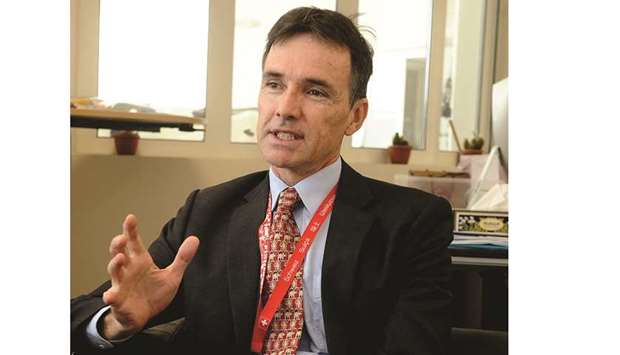“The mediocre teacher tells. The good teacher explains. The superior teacher demonstrates. The great teacher inspires.” Thus spake William Arthur Ward, a noted American writer.
In the ever-changing world of modern day education, knowledge is fast becoming a lesser weapon. The role of a teacher today cannot be explained better by anyone other than an experienced educator and administrator.
Briton Philip Bradley is the principal of Swiss International School Qatar (SISQ) that was established two years ago. The school may be new but Philip is not new to International Baccalaureate (IB) curriculum that is followed by the school. He has been a teacher for more than 33 years and carries international experience of being a teacher and principal in different countries.
Community recently sat with the seasoned educator and interviewed him about his life, experience, education philosophy and future vision.
Introducing himself, he said: “Interestingly, my parents also worked overseas when I was very young. They worked in Nigeria, Ghana and Cameroon. My first education was in a very small school in Ghana. I finished my primary school in England and got my university degree in geography and geology.
“I did some post-graduate teachers’ training after the university. To be honest, I wasn’t so sure, but decided to give it a go. Very quickly, I knew I had found my passion. I started my teaching career in 1985 with John Beddoes School in UK. The school was founded in 1565.
“My first experience of working overseas was in France with an American school. Then, I worked in Tanzania and followed it up with a 5-year stint in Saudi Arabia. My next job was in Peru. Then, we moved to Bangkok in Thailand. It was in August 2017 that I joined SISQ. I wanted to join the school as it was new and I felt I could make a positive difference by bringing together many years of best practices and ideas from my past.”
When asked to share his experiences as an educator, Philip said: “I think what I have learnt is that for anybody to reach their full potential, there had to be certain conditions. So, the job of a teacher or a principal is to optimise the conditions so that the kids can learn to their full potential. Some of these conditions are the same no matter in what part of the world you are in. The most important thing is that the students feel safe emotionally when they come to a school. Neuroscience confirms this. If a student comes to the school afraid of making mistakes, afraid of a teacher, afraid of a classmate or even afraid of a subject, it is not right. One of the most important things is to make the right emotional contact so that the students feel safe taking risks and doing things they might not be very successful at. Because if you only ever do things you know that you are going to be successful at, you are not really learning. You are just staying still.”
He added: “I have experience with different kinds of curricula. The single that has been consistent through my career is the curriculum of IB. The IB curriculum is very idealistic, and aims to develop inquisitive, knowledgeable and caring young people who help to create a better and more peaceful world through intercultural understanding and respect. As a principal, I expect our graduates to play their part in making the world better.
When asked what new things SISQ had to offer, he said: “There are several very good schools in Doha and we wanted to be one of them. I think that our community expects SISQ to be a caring community that places emphasis on the emotional wellbeing of our students. Our focus is learning over assessment and testing. Here, it is concept over content. Big ideas and global context are important.”
Describing the role of a modern day teacher, Philip said: “Negatively speaking, the best of way for an educator to mess up with the students’ education is to take one point of view and stick to it. And, that is true in many other spheres of life. For me, the best teacher is the one who is able to see a situation or solution from multiple perspectives. I expect teachers to model the same attributes we want from our students. If we want our students to be risk takers and open minded, I expect my teachers to be risk takers first.
“To me, knowledge is no longer a strategic advantage [for a teacher]. It is available for everybody. Knowledge is important but I want to know what the students will do when they do not know something. I want to know that having googled something, they have the intellectual capacity and understanding to say it is fake or real news. Creativity is also very important for the students. We are also going to host with some other schools a conference on role of artificial intelligence in education soon. We provide constant training opportunities to our teachers. We also train our community and parents. We also aim to educate all within our community.”
Elaborating on his experience of dealing with diverse students and teachers, Philip said: “There is a lot of diversity in our community and it adds complexity to our job. We are a very complicated family. We have embraced the complexity and do not want to avoid it. To make the world a better place, it is imperative to discuss sensitive issues and not to avoid them.
Another unifying goal for all students is the need to have a sense of fulfilment or achievement. For that to happen students must be prepared to do difficult tasks — such as those that may take several lessons to solve.
Speaking about his future plans, he said: “My expectation is that the Swiss school graduates will be known globally as having positive qualities and traits. Personally, I have not changed my goal for last 30 years. I like to stay as close to the learning as possible, support students and colleagues and to have fun.”
About Qatar, the educator said: “I see this country, being very young, very idealistic. I think that is good. I think Qatar is an ambitious country. The government has rightly recognised the role of education in what this country will be. More than anything, you need well-educated people. And it is good to be a part of that.”

MAKING A POINT: u201cIf we want our students to be risk takers and open minded, I expect my teachers to be risk takers first,u201d says Philip Bradley. Photo by Shemeer Rasheed


